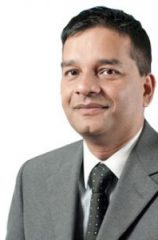In conversation with
Sanjeev Gopaul
CEO | Credentia Group

FDI Spotlight: Looking over the past five years since the Group’s establishment, of which accomplishments are you the proudest?
Sanjeev Gopaul: The last five years have been very enriching and eventful with its load of successes and failures, which are natural for any business. Our biggest achievement is that we have been able to build a group with diversified activities in sectors such as financial services, healthcare, business process outsourcing and hospitality, along with a well-thought strategy.
Going back to 2012, I started the first business, which unfortunately encountered rough patches with debts and no clients. Therefore, I bought back my partner’s share and start afresh. From that moment until today, we can say that even though we have evolved slowly, it has been in the right direction. This experience taught me the first lesson in entrepreneurship, which is to always do business with partners who share your values and ethics.
We have been able to differentiate ourselves from the competition by providing world-class services and by being involved with activities which are unique. For example, in 2016, we partnered with the Singaporean company IPPWORLD to provide business consulting, multi-lingual information and linguistics management to clients in the Indian Ocean and Africa. This is a unique and professional service in Mauritius, and we are involved in the translation of more than 22 languages from our Mauritian office. In the same vein, we launched our healthcare cluster and are already teaming up with global brands which we represent in Mauritius. We launched our outsourcing activity in 2017, and we are already providing accounting services to UK clients.
In short, Credentia continues to grow in a competitive environment where a few traditional groups, which support each other’s businesses to survive, dominates the economy. We believe in providing professional and personalised services to our clients.
How is the entrepreneurial spirit in Mauritius?
Sanjeev Gopaul: I believe there is a need to have a serious debate on entrepreneurship in Mauritius, as I am convinced that the concept of entrepreneurship is not well understood here. We think entrepreneurship is about producing low-quality products and then struggling to sell these in local and foreign markets. People here do not look at entrepreneurship to provide solutions to everyday problems.
The Mauritian government has been making efforts towards promoting entrepreneurship for decades. However, the results are not there, making me conclude that the strategy needs to change. Our economy continues to be run by traditional groups who collude with each other, thus killing many aspiring entrepreneurs.
For example, if we look at the top 50 companies in Mauritius, we see few who are synonymous with an entrepreneurial spirit. Most of the businesses are successful through the ownership of real estate. Today’s generations are not educated about real entrepreneurship at universities, and the ambition of most of the young people is to work for the big groups. They do not have examples of successful local entrepreneurs who they can learn from and follow.
Credentia has been helping young people with great ideas to set up their businesses; we either invest in them or advise them. We have also partnered with promising entrepreneurs and are working towards the creation of unique businesses. To be successful, we believe that entrepreneurs should create businesses which are unique. The services or products should aim towards international clients as the local market is too small.
Credentia stands out from the crowd by pursuing unique business opportunities rather than following the lead of the big groups. What is your strategic plan for the future?
Sanjeev Gopaul: Credentia is in business for the long term, and we want to leave a legacy which we would be proud of. Our strategic plan is to expand our footprint in the Indian Ocean and Africa. How would we achieve this? By associating ourselves with world class players and trying to bring them to do business in the region.
In financial services, we would continue our strategy to bring regional headquarters in Mauritius to serve clients in Africa and the Indian Ocean. Our ambition is to become the referenced and preferred service provider to investors looking to do business in the region. For our medical cluster, we are working with European companies to set up their production houses in Mauritius, especially for hi-tech medical equipment. Our outsourcing business is positioned to be the growth engine of our group, and we definitely would partner with a major shared service provider.
Can Mauritius as the International Financial Center (IFC) of Africa be realised?
Sanjeev Gopaul: Mauritius has all characteristics to become the IFC of Africa. It is strategically located in a convenient time zone, has political and economic stability, a bilingual work force and strong legal framework. We are FATCA compliant and have implemented the Common Reporting Standard for Automatic Exchange of Information. Our country is ranked first in various regional rankings and has been compared to Singapore and Dubai.
The ingredients are there; however, serious work needs to done to promote Mauritius as the IFC of Africa. Today, the use of Mauritius as an IFC is not well known to foreign investors who invest in Africa and the region. Our island continues to be perceived as a tourist destination. Every week there are millions of US$ channelled towards Africa, and Mauritius is the ideal jurisdiction to structure these investments, set up headquarters and for arbitration. We need to have a clear and long term strategy on how to reach the investors doing or looking to do business in Africa.
How can the private sector be more involved with the academia to promote more innovation in Mauritius?
Sanjeev Gopaul: Mauritius does not have a culture where academia is used to promote innovation, as seen in Europe or the United States. First, we need to work on the academia-private sector relationships so that resources can be shared, new business models can be created, or students can be connected to start-ups or spin-offs. The private industry can provide funds to academia for research and development, or companies can invest in incubators involved in innovation.
What business leaders do you admire and follow for your benefit?
Sanjeev Gopaul: I admire the business philosophies of people like Jack Welch, Howard Schultz, Donald Trump, Jack Ma, Andy Grove and Richard Branson. When reading about the journeys of these wonderful leaders, there are universal lessons which we learn – be passionate, never give up, failures bring experience, rejection is part of life, and we should always aim to create service or products which make a difference in the lives of people. These leaders inspire me in my every day’s work, and I incorporate their philosophies wherever possible.
